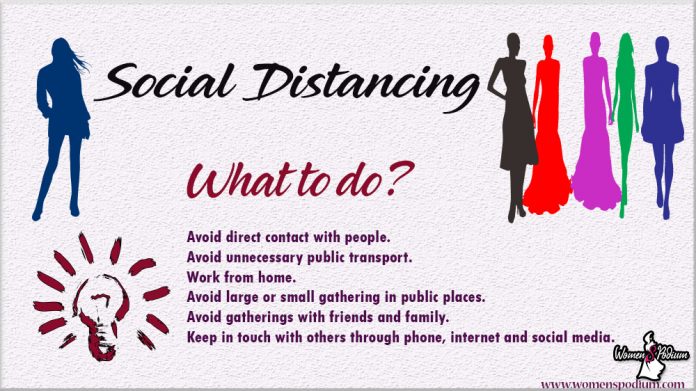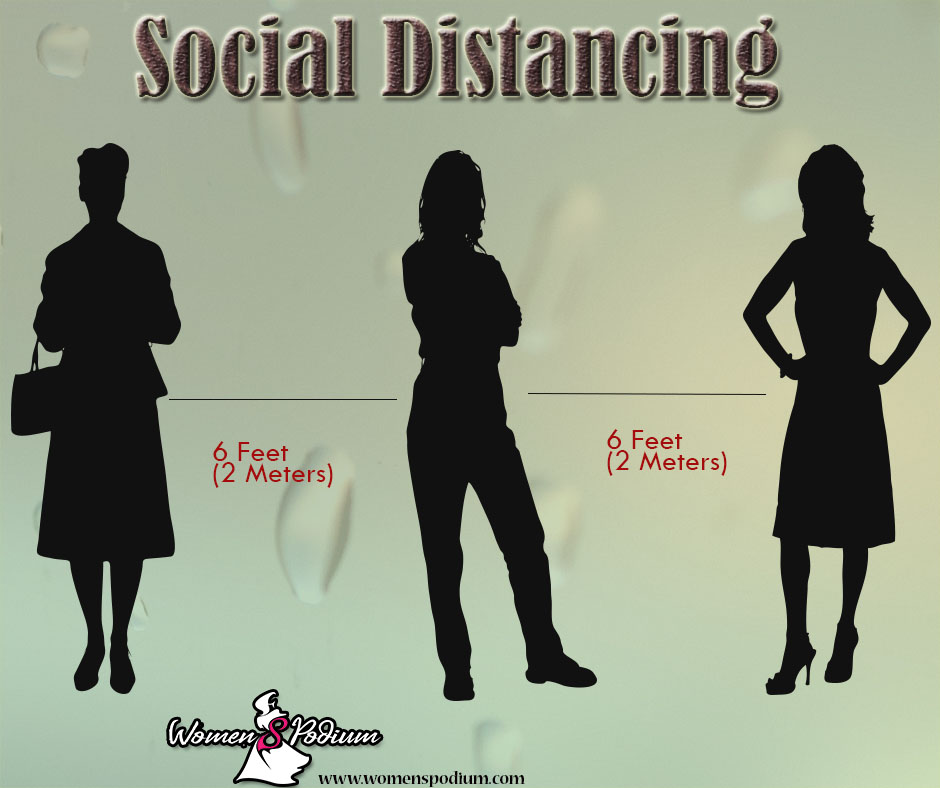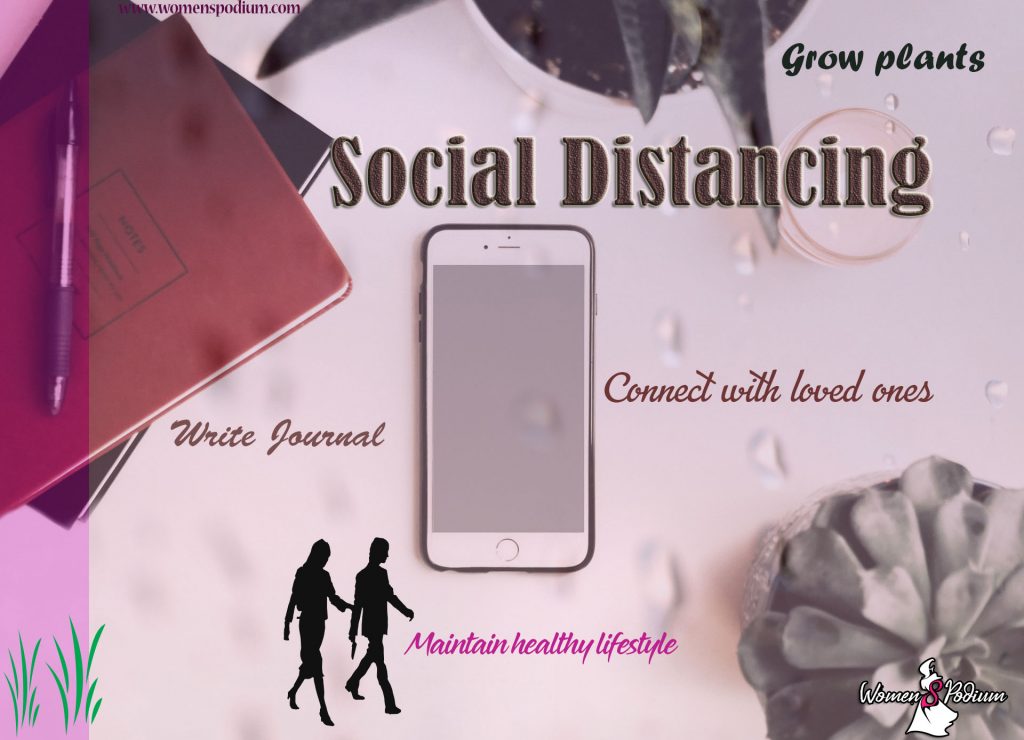
In this hi-tech era, we would have never imagined the whole world on the same plane. Coronavirus (COVID-19) has crossed almost all the borders around the world. Without any medication, people have only one option left is – social distancing. What really is social distancing? Well, this is the topic of discussion today!
People are in chaos, in lockdown, some are in quarantine and isolation, few are recovering, and many are losing their life, but this doesn’t mean we should lose hope and make ourselves emotionally weak. This the time to stand together to fight the coronavirus epidemic and maintain social distancing protocols. Many businesses are on the verge of a shutdown due to global economic downfall. Fear of losing jobs is one of the biggest concerns for a lot of people during this time. It is quite certain; panic and fear can make a person weak and mentally disturb. It’s the time to endure the worst of coronavirus crisis by making yourselves mentally and physically strong, so work on your immunity system, go for a balanced diet and follow a healthy lifestyle.
Understand the Importance of Lockdown and Social Distancing
Recommended Guide: How Women should work on their Immune Response

If you want to be safe and take precaution against coronavirus, then understanding the importance of lockdown and maintaining social distancing are mandatory. Let’s have a detailed discussion over social distancing but before it, read this brief info on Social Distancing, Quarantine, and Isolation.
Social Distancing
It means to keep a safe distance of approx—six feet from other people. Avoid crowded places, such as schools, religious places, sports events, shopping malls, movie theatres and public transportation. Until now, maintaining social distance is the only way to keep the people safe from infection. It also prevents infectious disease from spreading quickly.
Quarantine
When people don’t follow the protocols of social distancing, quarantine is the second stage. Once a person is exposed to coronavirus, he has to go through the quarantine process in which he is prohibited, separated and restricted to contact other people. Also, the patient is put under observation to see if he develops sickness or not.
Isolation
This is the final stage; when a person is diagnosed with COVID-19, he must be in isolation. In isolation, an individual who is sick is separated from other people who are safe until now. The patient lives in complete isolation so to prevent spreading the infectious disease to others. It lasts as long as the condition is transmissible.
Why Social Distancing is Mandatory

As on date, we know that there is no medication or vaccination available to counterattack COVID-19. Therefore, the best you can do to avoid the pandemic caused due to coronavirus is to avoid being exposed to this virus. The virus is said to be spread mainly from person-to-person and to stop it we have to maintain the protocols of social distancing. Strictly follow the below-given steps which can help to reduce social interaction between people.
The steps are:
- Avoid any type of direct contact with the individuals who have symptoms of coronavirus; the common symptoms of COVID-19 are high fever, dry cough and breathlessness.
- Avoid going outside without any significant motive. Also, try your best not to use public transport unless it is required or highly urgent.
- Talk to your employer and work from home with sincerity. This is the time where humanity is a must. So, you both must be generous and cooperative to each other.
- Don’t go to public places without wearing a mask and gloves. Keep sanitizers with you. During this time; pen spray hand sanitizers are helpful as they are easy to carry.
- Bypass a large, or a small crowd in public places. Even gatherings with friends and family are also not advisable. Limit the face-to-face communication with friends and family.
- Keep in touch with others via cell phone, SMS, WhatsApp, through other social media platforms and mobile apps.
- People over the age of 70, pregnant women and those who have severe health conditions, such as diabetic, should strictly follow the protocols of social distancing.
When there is no medication to combat COVID-19, social distancing is indeed only the safest options for everyone around the world. Italy’s tragedy is something we can’t overlook, and we should learn and take steps to keep ourselves safe on time. When it comes to respiratory hygiene, washing our hands play a significant role.
To prevent infection from respiratory viruses, there are basic principles for respiratory hygiene which we should follow
- Wash your hand quite often with handwash or soap and water for at least 20 seconds. If washing hands frequently is not feasible, use hand sanitizer. Whenever you go to work, or get back at home, blow your nose, sneeze, cough, eat or cook food, make sure to wash your hand with soap and water or sanitise.
- To maintain respiratory hygiene, it is must to avoid touching your eyes, nose and mouth with dirty hands. Eyes, nose and mouth are sensitive organs and door to viruses and bacteria to enter into our system. So, it is essential to keep in mind that you must wash your hand before touching your face during this coronavirus outbreak.
- Always cover your mouth with a tissue when you cough or sneeze, dispose of the tissue in a trashcan and then wash your hand properly with soap.
- Avoid close interaction or physical contact with the people who have symptoms of respiratory sickness.
- Either home or workplace, keep your surroundings clean. Disinfect frequently all the touched stuff, surfaces and floors.
Some Distinctive Reactions due to Social Distancing, Quarantine and Isolations
The panic of pandemic COVID-19 among people is severe and traumatic. The repercussion is that everyone reacts differently because everyone perceives in a different way. Therefore, people may feel anxiety, fear, worry about:
- their own health conditions.
- the health conditions of their loved ones.
- what if exposed to the disease?
- being quarantined and isolated.
- losing their life and family.
- infecting their loved ones and as a result, feel resentment that their dear ones have to go into quarantine due to them.
- the painful experience of monitoring themselves for signs and symptoms of COVID-19.
- losing job and loss of income.
- managing groceries and other personal care items.
- effectively taking care of children and families.
- the uncertainty of the lockdown period.
- the frustration leading to loneliness.
- the boredom and frustration due to a monotonous routine
- not to perform day to day activities efficiently.
- getting exposed to the disease because of other’s carelessness.
- the uncertainty of the situation and medication.
- indulging in drug or alcohol use.
- getting depressed.
- negative thoughts like hopelessness, and carelessness.
These were some thoughts that usually a person goes through in a time of social distancing. To uphold social distancing is a daunting task; as we humans are social beings, and society is an integral part of our life. But when it comes to life, we must let our emotions rest for some time. Staying at home for the first week is like a vacation, later days are tough and become monotonous at some point. We can do nothing until any medication or vaccination is available. What we can do is: maintain law and order, follow protocols, maintain social distancing, and try to stay at home most of the time.
How to Cope During Social Distancing

To face and live normally during an infectious outbreak; knowing, how to cope with the given situation is very important. Check out the below discussed insights about how to cope and support yourself during social distancing, quarantine, and isolation:
Know the Risk
When we talk about dealing with any serious condition; it is about knowing the risk, and understanding, what is going on. What’s the risk involved if you don’t comprehend the situation you are going through? Try to understand thoroughly and keep people around you safe. It is crucial to analyze and understand the real risk that can harm you and others around you, especially when the risk is due to an outbreak of an infectious disease with no cure. Don’t entirely rely on media during this time as it can be inaccurate at times. So, the best is to go to the official site of WHO; you will get all the relevant information there.
Maintain your Routine
During the lockdown, many people struggle with their routines. Maintaining good habits isn’t easy. Waking up late at night, playing games like PUBG, and enjoying late-night movies aren’t going to benefit you. Make sure you stick to your routine. Get up on time, and do some light exercise, yoga, or breathing exercises. Go through your morning timetable as if nothing has happened or changed. If your company allows you to work from home, then maintain a routine with earnestness. Following up a strict routine can make your life relaxed to cope up with the lockdown.
Trust Only Reliable News Sources
When it comes to the news channel, make sure it is a reliable one, and the same goes with websites too. If you want to read news about COVID-19, it is best to browse WHO, NHS, and NCBI. Most people read the news on various social media platforms; social media is useful to connect with people, but not to rely on for any other information. Relying on social media information on COVID-19 is not a wise decision. Don’t believe in forwarded messages; it could be a hoax; therefore, it is better to count on trustworthy sources for information on the infectious disease outbreak.
Don’t Watch News 24X7
Watching the news all the time can lead you straight to depression. It is good to stay up to date on what is going on around you, but it must be within a time limit. Avoid watching or listening to the news for unlimited time as it tends to arouse anxiety and fear. Also, don’t discuss any reckless discussions in front of children, nor allow them to watch the news without your supervision, as they can be disturbed by what they hear and see on TV on their own.
Connect with Your Family and Friends
Face to face talk with close people may have been limited due to the lockdown. Still, you are lucky that you’re living in this internet age, where within a few seconds you can know every minute details about your nearest and dearest. Connect with your family, friends, colleagues, neighbours, via phone, text messages and social media. You can video chat through Skype, Facetime and WhatsApp. To be in touch with people who are trustable to you is a kind of therapy, and an excellent way to release frustration, reduce anxiety and depression. Talking to people who match your wavelength helps to lessen the pain of loneliness and boredom during the time of social distancing, quarantine and isolation.
Talk to your Doctor
When nothing is definite, and you are confused, instead of talking here and there, it is advisable to contact your family doctor to know about the real situation. Although doctors all around the world are busy, still you can call and schedule remote appointments via Skype or Facetime. Feel free to ask questions and clear all your doubts. Talking to your doctor can help to reduce any distress related to social distancing or COVID-19.
Talk to your Employer
During this lockdown, two data are on the verge of disappointment; the first is the rapid growing case of COVID-19, and the second is the numbers of job losses all around the world. Staying home to be safe is fine but dealing with financial stress is something that can anguish you to a greater extent and lead to depression. So, to overcome this situation, it is better to talk to your boss, if work from home is possible, go with it with 100% sincerity. If your job nature doesn’t fall under work from home, talk to your other colleagues and employer to seek out ways to cope in this situation. Also, side by side, see if you can apply for online jobs. Make sure to be strong and determined. If you are unable to work now, later, you are going to face financial stress or job loss. During such situation give a clear explanation to your employer. Being honest can be your saviour.
Relax your Body and Mind
During such a stressed condition, using practical ways to cope and relax is the only way to relax your body and mind. Try to do yoga, meditation, stretching, Pilates, deep breathing or just pray. Play indoor games like Ludo, carom, card games, board games or any other activities which you enjoy. Read your favourite books or watch movies or dramas of your palate. Share your experience and feelings with your loved ones. Make sure to ignite your hope and believes all the time, be a positive thinker, spread positive thinking within your social circle. Also, you can write a journal it also helps to stress out. All these activities can make your mind and body relaxed and happy.
How to Deal Aftershock of Social Distancing
After social distancing, quarantine, and isolation, dealing the aftershock is quite an effort. You can go through various mixed emotions – right from anxiety, fear, distress, to the sense of relief. This feeling of relief is a ‘ray of hope’ to you and people around you who are scared due to pandemic. You must share positive vibes and your experience with the people around you. Alert them about the mistakes that you did. Dealing with PTSD is not easy for everyone; still being positive and spreading awareness can heal you faster. If you experience symptoms of extreme trauma and anxiety:
- such as a sleeping disorder,
- failure to carry out daily routine activities,
- unable to eat properly or
- getting addicted to drugs or alcohol,
It’s the high time to speak to your family doctor or your health care provider, or you must call the hotlines listed for a right referral. If you are overwhelmed with emotions such as grief, anxiety, depression, nervousness, fear, or feel like you want to harm yourself, immediately seek help from your doctor.
Conclusion
COVID-19 is a pandemic, and as on date, there is no specific medicine to prevent or treat coronavirus disease (COVID-19). It is a global threat and drug makers large and small all have conjoined together to develop their best notions to thwart the pandemic. A lot of researches are going on to develop drugs and vaccines for COVID-19; most of the developed nations are working 24×7 to develop drugs. Once the clinical trial is over, and the appropriate medication is developed, they are ready for the commercial production and distribution to the entire world. Also, the world leaders have indicated that it will take at least one year to develop a vaccine for COVID-19, but the drug is expected to come much before.
As per various sources, the coronavirus drugs and vaccines are in different stages of development, across the world. So, till then, we must keep patience, and until the drugs are not available, we must follow the protocols of social distancing. It’s not about following Government’s law and order; actually, it is about our sense of duty for ourselves and our family. Don’t believe in myths or hoax messages, only trust on official websites, authentic news channel for any information related to coronavirus or COVID-19. Keep hope alive and fight with depression and negativity.
Also, while my read-on Bloomberg, I got an exciting quiz, which I want to share with readers of Women’s Podium. Do check it out; it is interesting 11 questionnaires about COVID-19, titled as ‘How Much Do You Really Know About Coronavirus?’
I have tried my best to include everything in this article about this lockdown and social distancing. People are eager about what to do and how to cope? So, I tried my best to share my views. Do share your comments and opinions via comment section. Till then, Stay Home! Stay Safe!






Brilliant article and this message must reach the masses